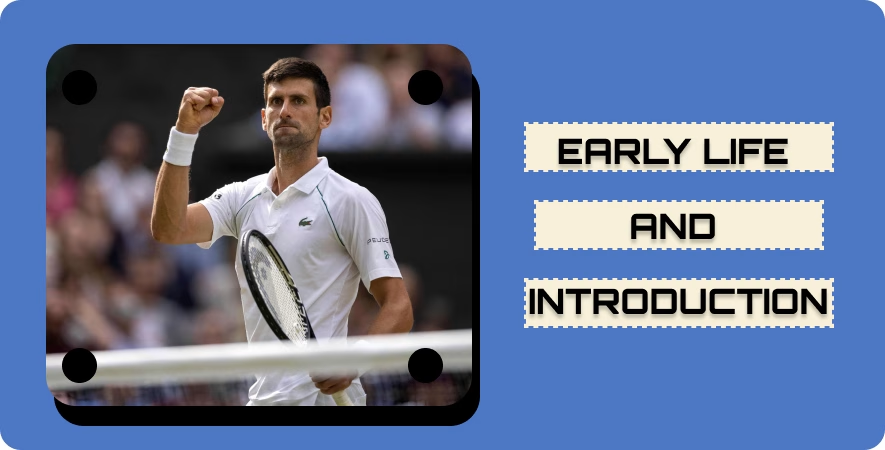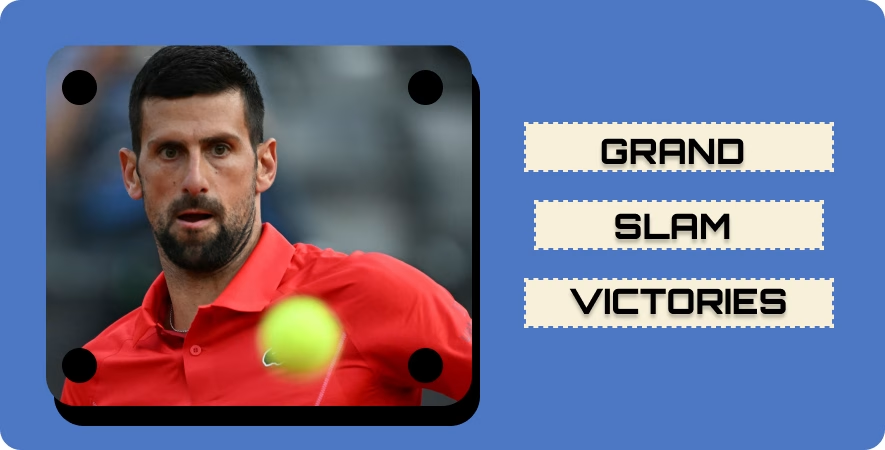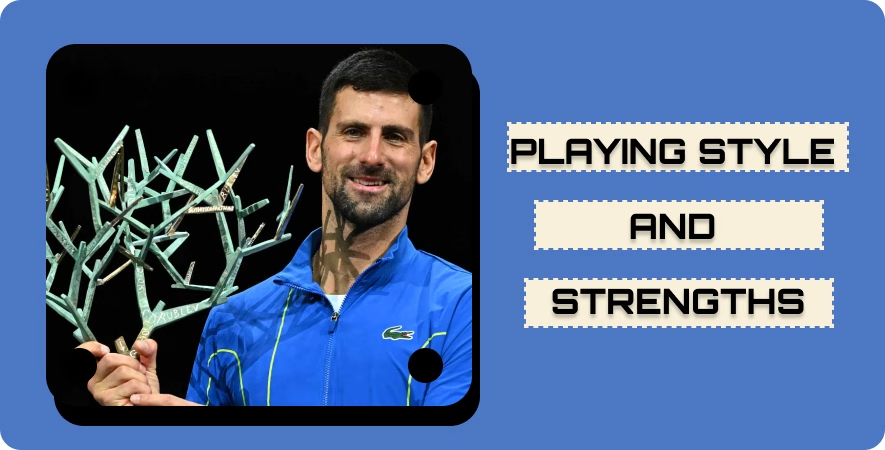Novak Djokovic, a Serbian tennis player, has molded modern tennis with his Grand Slam titles, intense rivalries, and unparalleled impact on the sport’s evolution.
Early Life and Introduction to Tennis

Novak Djokovic’s journey into tennis commenced in Serbia, a nation not traditionally known for producing tennis champions. Born in Belgrade, Djokovic displayed an early passion for the game, which his family nurtured despite limited resources. His parents recognized his potential and made significant sacrifices, investing in his future by enrolling him at the Niki Pilić Academy in Germany. This move proved pivotal as it provided Djokovic with the professional training needed to hone his natural talent. Yet, it wasn’t merely technical skills that set him apart; it was his determination to overcome obstacles, both on and off the court. Such resilience became a hallmark of Djokovic’s career, foreshadowing his future dominance in the Grand Slam titles arena.
Family Background and Early Influences
Novak Djokovic’s upbringing in Serbia was marked by his family’s dedication to nurturing his tennis potential, despite economic challenges. His parents, Srdjan and Dijana Djokovic, owned a pizzeria and pancake restaurant where young Novak Djokovic often helped out. Their entrepreneurial spirit and work ethic undoubtedly influenced Djokovic’s relentless pursuit of excellence. The war-torn backdrop of his childhood in Belgrade instilled resilience, shaping his psychological fortitude on the court. It was his father’s belief in his talent that encouraged Novak to train under Jelena Genčić, a renowned coach who recognized his extraordinary promise. Her guidance and mentorship laid a solid foundation for Djokovic’s future successes. These early influences were pivotal, setting the stage for him to become a world number one and a dominant force in tennis.
Training at Niki Pilić Academy
Novak Djokovic’s decision to train at the Niki Pilić Academy was a turning point in his formative years as a tennis player. Located in Germany, the academy offered Djokovic an environment far removed from the limitations of Serbia. Under the tutelage of Niki Pilić, a former Grand Slam champion, Djokovic honed his technical skills and developed a disciplined training regimen. This period was crucial for enhancing his tactical acumen and physical conditioning, laying the groundwork for his future success on the ATP tour. However, the transition wasn’t seamless; it required significant adaptation to a new cultural environment, which tested his resilience and commitment. These challenges ultimately fortified Djokovic’s mental toughness, a defining characteristic that contributed to his ascension as a tennis legend.
Rise in Junior Tennis Circuits
Novak Djokovic’s ascent in the junior tennis circuits was marked by his exceptional talent and strategic gameplay, setting him apart from his peers. Competing against some of the most promising young players globally, Djokovic consistently showcased remarkable resilience and tactical prowess that hinted at his future dominance in professional tennis. His early victories in junior tournaments not only boosted his confidence but also attracted attention from top coaches and sponsors. Nevertheless, this rise was not without its challenges. Djokovic faced intense competition, which required constant adaptation and improvement. The rigorous demands of frequent travel and competition tested his physical and mental limits. Yet, these experiences on the junior circuit were instrumental in shaping his competitive edge, laying a strong foundation for his illustrious Djokovic career.
Grand Slam Victories and Major Career Milestones

Novak Djokovic’s career is distinguished by his remarkable achievements in Grand Slam titles, underscoring his status as a preeminent figure in tennis. Beginning with his inaugural major victory at the 2008 Australian Open, Djokovic rapidly cemented his place among the sport’s elite. His pursuit of the Career Grand Slam was realized with triumphs at the French Open, Wimbledon, and the US Open. Each victory not only added to his impressive tally but also demonstrated his adaptability across diverse surfaces. Despite facing formidable opponents, Djokovic’s relentless drive and strategic acumen enabled him to set multiple tennis records. His tenure as world number one further highlights his dominance, though critics often scrutinize his on-court demeanor and occasional outbursts.
First Grand Slam Win⁚ 2008 Australian Open
Novak Djokovic’s breakthrough came with his first Grand Slam title at the 2008 Australian Open, a victory that redefined his career trajectory. This win was significant as it ended the Federer-Nadal duopoly, marking the emergence of a new contender on the tennis scene. Djokovic showcased exceptional skill and mental resilience, defeating Jo-Wilfried Tsonga in the final with tactical precision. His performance throughout the tournament was characterized by powerful baseline play and unwavering focus under pressure. However, critics noted that his path to victory was somewhat facilitated by Nadal’s earlier exit, raising discussions about the quality of competition faced. Nevertheless, this triumph was pivotal, propelling Djokovic into the limelight and setting the stage for numerous subsequent Djokovic achievements.
Completing the Career Grand Slam
Novak Djokovic’s completion of the Career Grand Slam stands as a testament to his versatility and dominance across all playing surfaces. Achieving this milestone required victories at the four prestigious tournaments⁚ the Australian Open, French Open, Wimbledon, and US Open. His triumph at the 2016 French Open was particularly significant, as clay was often considered his least favorable surface. Critics argue that his path was occasionally eased by the absence or early exits of key competitors like Federer and Nadal. Nevertheless, Djokovic’s strategic adaptability and mental strength were pivotal in overcoming these challenges. This achievement places him among an elite group, reinforcing his legacy and bolstering his position within tennis records and ATP rankings.
Record-breaking 24 Grand Slam Titles
Novak Djokovic’s achievement of winning 24 Grand Slam titles is a landmark in tennis history, underscoring his unparalleled consistency and excellence. This record-breaking feat places him above legends like Federer and Nadal, though it invites scrutiny regarding the era’s competitive environment. Critics question whether Djokovic benefited from a transitional phase in men’s tennis, yet his ability to maintain peak performance over years remains indisputable. Each tournament victory was characterized by strategic brilliance, mental fortitude, and adaptability, elements integral to his sustained success. While debates about his on-court demeanor persist, Djokovic’s contributions to the game through such milestones are undeniable. His record reinforces his standing as a defining figure in modern tennis, inspiring future generations and reshaping perceptions of athletic longevity.
Playing Style and Strengths on the Court

Novak Djokovic’s playing style is a masterclass in precision, resilience, and tactical intelligence, often leaving opponents bewildered. His baseline dominance and exceptional defensive skills form the bedrock of his game, allowing him to counteract aggressive play with remarkable consistency. Critics might argue that his approach lacks the flamboyance seen in other legends, yet his results speak volumes about its effectiveness. Djokovic’s unparalleled ability to adapt across different surfaces demonstrates his comprehensive understanding of the game. His penchant for long rallies tests adversaries’ endurance, often leading to critical errors. Strategically, Djokovic leverages his mental toughness, turning pressure situations into opportunities. This calculated yet unyielding approach not only secures victories but also cements his reputation as one of the most formidable players.
Baseline Dominance and Defensive Skills
Novak Djokovic’s baseline dominance is a cornerstone of his playing style, characterized by relentless precision and strategic depth. His ability to sustain long rallies showcases unparalleled defensive skills, often turning defense into offense seamlessly. Critics might argue that this approach lacks the flair of other tennis icons; however, its effectiveness in neutralizing opponents’ strengths is undeniable. Djokovic’s court coverage is exceptional, allowing him to retrieve seemingly impossible shots and maintain pressure on adversaries. This defensive prowess forces opponents into errors, disrupting their rhythm and confidence. While some view this as a conservative strategy, it undeniably contributes to his impressive win record. Djokovic’s baseline mastery not only secures victories but also redefines modern tennis dynamics, challenging players to elevate their tactical acumen.
Adaptability Across Surfaces
Novak Djokovic’s adaptability across various playing surfaces is a testament to his strategic brilliance and comprehensive skill set. His ability to transition seamlessly between clay, grass, and hard courts distinguishes him from many contemporaries. Critics often highlight his less aggressive style compared to rivals; nevertheless, this adaptability underscores his profound understanding of surface-specific dynamics. On clay, he showcases patience and precision, while on grass, his movement and serve-return game shine. Hard courts amplify his baseline mastery and defensive resilience. This versatility not only contributes to his Grand Slam titles but also redefines expectations for modern players. By mastering diverse conditions, Djokovic sets a benchmark in tennis, challenging future generations to develop similar adaptability to remain competitive at the highest level.
Mental Toughness and On-court Strategies
Novak Djokovic’s mental toughness is arguably his most formidable asset, setting him apart in crucial moments. His ability to remain composed under pressure is often the deciding factor in tight matches. Critics debate his on-court demeanor, yet it’s undeniable that his strategic mind games have rattled many opponents. Djokovic’s intelligent point construction and tactical variations keep adversaries guessing, often leading them into unforced errors. He employs a patient approach, waiting for opportune moments to strike decisively. Additionally, his resilience in five-set thrillers highlights his endurance and strategic depth. Although some view his psychological tactics as contentious, they contribute significantly to his success. By mastering this mental aspect, Djokovic not only secures victories but also redefines what it means to be mentally resilient in tennis.
Rivalries with Federer, Nadal, and Other Top Players
Novak Djokovic’s rivalries with Roger Federer and Rafael Nadal are legendary, forming the epic narrative of modern tennis. These encounters have been pivotal in defining Djokovic’s career, each match a strategic battle showcasing contrasting styles. Critics often debate whether Djokovic’s success against these icons stems from his peak coinciding with their decline. Nevertheless, his head-to-head records reflect his adaptability and resilience. While some question the sportsmanship displayed in heated moments, Djokovic’s ability to consistently challenge and often surpass these titans is indisputable. His emerging rivalries with younger players like Carlos Alcaraz add another layer to his legacy, pushing him to evolve further. Thus, Djokovic’s rivalries not only enhance his stature but also enrich the sport’s competitive dynamics;
Djokovic vs Federer⁚ Clash of Titans
The Djokovic vs Federer rivalry is emblematic of tennis excellence, often described as a Clash of Titans. Their matches showcase two distinct playing philosophies⁚ Federer’s elegant aggression versus Djokovic’s strategic resilience. While Federer commands a vast fanbase due to his graceful style, critics argue that Djokovic’s clinical efficiency lacks similar charisma. Despite this, Djokovic’s superior head-to-head record implies dominance in their encounters. The 2019 Wimbledon final epitomizes their rivalry, with Djokovic outlasting Federer in a historic five-set thriller. Some purists lament the overshadowing of artistry by athleticism; however, Djokovic’s mental fortitude during high-stakes confrontations is commendable. Ultimately, this rivalry not only heightens their individual legacies but also enriches tennis, challenging players to adapt and innovate continually.
Djokovic vs Nadal⁚ A Legendary Duel
The rivalry between Djokovic and Nadal is arguably the most intense in tennis history, characterized by epic battles of endurance and skill. Their contrasting styles—Nadal’s relentless aggression against Djokovic’s impenetrable defense—create matches full of drama and tension. Critics argue that these contests often become attritional, overshadowing flair with physicality. Nonetheless, Djokovic’s ability to challenge Nadal, especially on clay, highlights his adaptability and mental toughness. The 2012 Australian Open final remains a testament to their legendary duel, lasting nearly six hours. While some purists critique the emphasis on stamina over artistry, this rivalry undeniably pushes both players to their limits. Through these encounters, Djokovic not only solidifies his legacy but also contributes to the evolution of modern tennis dynamics.
Emerging Rivalries with Younger Players
Novak Djokovic faces emerging rivalries with younger players, such as Carlos Alcaraz and Jannik Sinner, challenging his dominance. These new competitors bring fresh energy and innovative styles, often pushing Djokovic to adapt swiftly. Critics argue that Djokovic’s matches against the younger generation sometimes lack the historical weight of his Federer and Nadal encounters. However, these rivalries are crucial in testing Djokovic’s ability to maintain his top form amidst evolving tennis dynamics. Although some suggest his experience gives him an edge, the unpredictability of youth poses genuine threats. By engaging with these rising stars, Djokovic not only extends his competitive longevity but also influences future tennis tactics and strategies. This interaction fosters a transitional phase in the sport, bridging generational gaps.
Legacy and Impact on Modern Tennis

Novak Djokovic’s legacy in modern tennis is both profound and transformative, marked by his record-breaking Grand Slam successes and strategic evolution. Critics argue that his achievements are occasionally overshadowed by controversies and intense rivalries. Yet, his influence extends beyond titles, reshaping the very fabric of competitive tennis. Djokovic’s dedication to physical conditioning and mental resilience has set new benchmarks for aspiring players, challenging traditional approaches. His advocacy for player welfare and involvement with the ATP Players Council further highlight his commitment to the sport’s progression. While some debate the impact of his on-court demeanor, Djokovic’s role in driving tennis into a new era is undeniable. Through his accomplishments and initiatives, he not only cements his status but also inspires future generations.
Influence on the Next Generation of Players
Novak Djokovic’s influence on the next generation of players is multifaceted, encompassing his relentless pursuit of excellence and innovative techniques. Critics acknowledge that while his methods might lack the aesthetic appeal of predecessors, his effectiveness remains indisputable. Young players today often emulate Djokovic’s physical preparation, mental toughness, and strategic adaptability. His focus on nutrition and recovery has introduced new standards within tennis training regimens. Additionally, Djokovic’s on-court tenacity and resilience in high-pressure scenarios offer a blueprint for aspiring talents navigating competitive environments. Though some debate his emotional outbursts’ impact on sportsmanship, his overall contribution to shaping modern tennis paradigms is significant. By demonstrating how discipline and innovation can coexist, Djokovic inspires upcoming players to push boundaries and continuously evolve.
Contributions to Tennis Records and ATP Rankings
Novak Djokovic’s contributions to tennis records and ATP rankings are monumental, yet not without critical scrutiny. His record-breaking weeks as world number one highlight a period of dominance that reshaped competitive standards. Critics argue this supremacy occasionally overshadows his sportsmanship controversies. Nonetheless, Djokovic’s achievements in consistently topping the ATP rankings underscore his technical mastery and strategic acumen. His ability to maintain peak performance across diverse surfaces challenges conventional limits, inspiring debate on modern athletic excellence. While some purists lament his matches’ lack of traditional elegance, his impact on tennis metrics is undeniable. Djokovic’s relentless pursuit of perfection continues to set benchmarks, compelling peers and future generations to innovate and adapt within an increasingly demanding sporting landscape.
Philanthropy and Off-court Impact
Novak Djokovic’s philanthropy and off-court impact demonstrate a commitment to societal well-being, albeit occasionally overshadowed by on-court controversies. Through the Novak Djokovic Foundation, he focuses on early childhood education, striving to provide equal opportunities in underserved communities. Critics suggest that while his philanthropic efforts are commendable, they sometimes serve as counterpoints to his polarizing public persona. Nevertheless, Djokovic’s advocacy for health and wellness extends beyond tennis, promoting holistic approaches to athlete care. His initiatives challenge traditional views, advocating for player-centric reforms within professional circuits. Despite mixed opinions, Djokovic’s off-court contributions highlight his multifaceted influence, bridging his athletic prowess with a broader humanitarian vision. These efforts underscore his intent to leave a lasting legacy that transcends mere sporting achievements.
